Posted by Elena del Valle on April 29, 2009
Article and photo by Fredwill Hernandez
President, Spanglish Entertainment LLC

Interviewer Leila Cobo and Don Omar at this year
The 20th Annual Billboard Latin Conference and Awards and Voz Latina Conference for song writers, artists, agents, artist managers, promoters, music publishers, marketers, and others targeting Latinos took place April 21-23, 2009 at the Eden Roc Beach Resort and Spa in Miami Beach. Approximately 1,000 people attended the panels, celebrity Q & A (questions and answer sessions), music showcases such as the 7th Annual Billboard Bash, and the 2009 Billboard Latin Music Awards broadcast live from Bank United Center in Miami.
The music industry highpoint of this year’s conference was a full question and answer session with Puerto Rican William Omar Ladron, known to fans as Don Omar, who gave attendees a first look at the video of the first single “Virtual Diva” from his new studio album, Idon. He talked about new ways of reaching his fans, new business models that are being put to the test and content he plans to make available to fans who buy one of his CD’s.
One of the bonuses his fans will receive will be a new song featuring Daddy Yankee, a fellow reggaeton performer he used to have a long standing feud with. Don Omar spoke about his acting debut role in the new Fast & Furious movie and his plans to retire in five years and run his music record label, Orfanato Music Group. During the Billboard Awards, Daddy Yankee received the Spirit Of Hope Award for his Corazon Guerrero Foundation ( Warrior Heart Foundation) whose mission is to help troubled and under served youth.
The three-day event ended with Voz Latina, a day long conference that catered to marketers and companies aiming to reach Hispanic consumers. The highlight of the Voz Latina event was a presentation by Jacqueline Hernandez, chief operating officer of Telemundo Communications Group and the day’s keynote speaker. She spoke on the best way for companies to tap into what she called “crucial Hispanic market” by using integrated advertising solutions, innovative models and success stories to help marketers and advertisers achieve their financial goals. Other panels and topics covered Spanish- Language content online, Interactive strategies to reach your target audience, Who wears the pants: The influential consumer, Tecate Case Study: growing in English by speaking in Spanish, and How to market in a recession.
This year’s sponsors included State Farm, Verizon Wireless, Burger King, Coca-Cola, Georgio Vodka, CMN (Cardenas Marketing Network), Recording Industry Association of America(RIAA), MTVtres, MySpace Latino, American Society of Composers, Authors & Publishers(ASCAP), Bustelo Coffee, Gibson guitars, and Locman.
Fredwill Hernandez is a musician and aspiring journalism student who expects to attend California State University Dominguez Hills in Los Angeles, California.
Posted by Elena del Valle on April 27, 2009

A Facebook page - click on image to enlarge
Are you thinking of joining the social networking wave? Depending on your interests there are several sites worth considering. Some people sign up and become active in multiple sites. If your attention span or time limits are strict you can try Flutter, self described as nano blogging with a limit of 26 characters per posting; or if you have more to say there’s the increasingly popular Twitter. For something more mainstream oriented with a profile listing, full length postings and widgets there are several very popular options.
Founded in 2004 as a collegiate website at Harvard, Facebook has the highest number of members, 200 million, according to the company website. Founded in 2003 and owned by Fox Interactive Media, MySpace follows with 120 million users. It is a popular choice for entertainers to post profiles. In addition to the main MySpace website and a Spanish language section for Spanish speakers in the United States, there are 33 portals in several languages available in three major areas of the world. MySpace Latino estimates there are nine million users on its pages. According to one monitoring portal, Facebook and MySpace are among the top five most visited websites in the United States.
Hi5, favored in Latin America, Europe and Asia, is available in 50 languages and 200 countries. The privately owned San Francisco based portal established in 2003 claims 80 millions fans. Friendster, a Mountain View, California based company established in 2002, is backed by Kleiner Perkins Caufield & Byers, Benchmark Capital, DAG Ventures, IDG Ventures, and individual investors. It reports a world audience of 100 million. It is especially popular in Asia.
Tagged, established in 2004, attracts teenagers in the United States and abroad. Headquartered in San Francisco, California the company lists 70 million members. Founded in 2003, LinkedIn has a modest membership of only 38 million in 200 countries compared to some of the other networks. It’s main distinction is that it is popular in the business community. The LinkedIn Answers section may appeal to professionals who want to be recognized as experts within the site. Four languages are listed on the company website: English, German, French and Spanish.
Google owned Orkut was initially an exclusive site for technology buffs when it started in 2004. In 2006, the portal was opened to the general market and developed a following, especially in Brazil, Paraguay and India. It boasts 25 million subscribers. Founded in 2005, Bebo has sites in the United States, United Kingdom, Ireland, Australia, New Zealand, Canada, Poland, France, Germany, Italy, Spain, India and the Netherlands. It is owned by AOL and has 22 million subscribers.

Fast Pitch Founders Bill Jula and Richard Swier
Sarasota, Florida based Fast Pitch was originally established three years ago by Bill Jula and Rich Swier as a national speed networking forum. According to a company spokesperson, the website which offers two basic levels of participation, paid and free, has been profitable for 30 months. There are 350,000 members with free memberships and an undisclosed number of paid subscribers. About five percent of the membership is Hispanic. In addition to English, Fast Pitch is available in German, Portuguese, Italian, two types of Chinese and Spanish.
Several portals provide forums for Spanish speakers and Latinos specifically. Quepasa Corporation, a publicly traded company based in West Palm Beach, Florida, targets users in English, Spanish and Portuguese through its portal Quepasa.com. According to a company spokesperson the portal, established in 1997, has 2.5 million members and grows by 100,000 users per week. The company has offices in Los Angeles, California; São Paulo, Brazil; Scottsdale, Arizona; Miami, Florida; and Hermosillo, Mexico.
“Quepasa has built a viral platform, powering culturally relevant media and contests, such as Playboy Mexico Cyber Chica contest and the Dr. Rey Health and Beauty contest,” said John C. Abbott, chief executive officer of Quepasa by email.
MiGente is part of Community Connect Inc., a New York based company. Other sites include Hispanito, Vostu and MiGrito. None of these portals replied to requests for information.
“Search Engine Marketing to Hispanics” audio recording

Presenter Matias Perel, founder and president, Latin3
Find out about
- The 16 million Latino online users
- Types of online access among Hispanics
- Latino online user language preferences
- What they do online
- Usage by age
- Income levels among Hispanics who visit the Internet
- Internet use by Hispanics
Click here for information on Search Engine Marketing to Hispanics
Posted by Elena del Valle on April 24, 2009

Danny D and Steve Styles
Photo: mun2
Beginning May 7, mun2 will air Xtreme: on the Verge, a seven part reality series, a joint effort of the cable network and Xtreme, a Latin R&B duo. The program will air at 7 p.m. ET on mun2. The show follows the day-to-day lives of the New York residents, Danny D and Steve Styles, as they juggle their daily routine and their search for music industry success. Scenes show them while they handle business, rush from planes to hotels to interviews, record in-studio sessions, perform for thousands and are pursued by fans.
“’Xtreme: On The Verge’ is a show that stays true to the mun2 brand by showcasing the uniquely American experience of bicultural Latinos in the U.S. today,” said Flavio Morales, vice president, Programming for mun2. “We’re excited to bring our viewers a true Bronx story with a universal appeal.”
The series, produced by Diamante Pictures, is designed to showcase the lives of the Bronx-based and raised artists. The program will be part of a multi-platform effort featuring a multi-screen component via the network’s online platform. The show characters, Steve and Danny, Ben, their manager, and Gladys, Danny’s mom, plan to participate in the mun2 social media platform; provide text message updates on their profile pages, and interact with viewers on each episode’s video page. Holamun2.com, the network’s online portal, will stream complete episodes as they hit the air. Advertisers include Verizon VCAST and Toyota.
“We’re excited to show viewers and our fans our day-to-day lives,” said Danny D. “Even though we’re blessed to have our singing careers going strong, we also have our moments of struggle like anyone else.”
“Being a young Latino in the entertainment business is great but not always easy,” said Steve Styles. “We want to show the public what it’s like to have one foot in the spotlight and the other in our hometown of the Bronx.”
Xtreme’s album Haciendo Historia (Spanish for Making History) achieved platinum sales. They received a 2009 Premio Lo Nuestro award nomination for Best Tropical Group of the Year, and are finalists for the 2009 Billboard Latin Music Awards for Hot Latin Song of the Year (No Me Digas Que No) and Tropical Album of the Year Duo or Group (Chapter Dos).
Launched in 2001, mun2 (pronounced moon-dos) offers bilingual programming for U.S. Latinos 18 to 34 years old. The multi-platform youth entertainment network is available nationwide to 29 million households on cable and television. The network is part of Telemundo Group, a division of NBC Universal Cable Entertainment.
“Moving Beyond Traditional Media Measurement: measuring conversations and social media” audio recording

Presenter Katie Delahaye Paine, founder, KDPaine & Partners
Find out about
- Issues affecting online public relationships today
- Testing relationships as part of a survey
- Measuring ethnic group relationships
- Measuring foreign language communications in a similar ways to English
- Biggest challenges measuring conversations and social media
- Measuring online relationships with little or no money
Click here for information on “Moving Beyond Traditional Media Measurement”
Posted by Elena del Valle on April 23, 2009

Luis Silberwasser
Photos: Discovery en Español, La Onda Verde
In an effort to spread the word among Spanish speakers about environmental issues and the state of our planet, Discovery en Español will launch a three part awareness campaign beginning this month. The company celebrated Earth Day, April 22, and began the campaign earlier in April with a multifaceted approach featuring on-air, online, and grass roots elements.
They hope these efforts will inform and inspire viewers to reflect on the state of the world, create awareness and motivate them into becoming an active part of the solution. The three parts of the campaign are a new Green Block Programming Initiative, two airings of the documentary An Inconvenient Truth, and “3 Pasos 3 Personas,” a new grassroots campaign in partnership with La Onda Verde. Scroll down to watch videos.
Discovery en Español premiered, for the first-time on Spanish network television in the United States, the movie An Inconvenient Truth with a Spanish language voice over April 19 at 9 p.m. ET/PT. The program will air again at the same time April 25. The famous documentary narrated by Al Gore and released by Paramount Vantage addresses environmental issues. It received an Oscar and a Grammy and Gore received the Nobel Peace Prize for his film related work.
“The Earth has always defined our brand. Programming is a key tool in our arsenal to communicate our love for the planet. Yet we view our commitment as more than the spectacular specials we bring to our audiences. That is why we continually look for additional ways to enlist and inspire,” said Luis Silberwasser, senior vice president and general manager of Discovery Networks U.S. Hispanic Group.
Discovery en Español is also unveiling the first component of a new partnership with La Onda Verde de NRDC, the division of the Natural Resources Defense Council created to inform and involve Hispanics in the protection of the environment. The joint campaign, dubbed “3 Pasos 3 Personas,” to be released on-air and online is a call to action for viewers to become involved by visiting discoveryenespanol.com/3pasos. See video below.
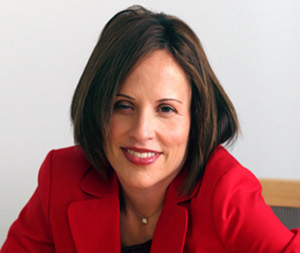
Adrianna Quintero
“The goal of this campaign and the online application developed for this purpose is to motivate viewers to make three simple eco-changes in their lives that can make a difference, and then inspire three friends to do the same,” said Adrianna Quintero, director of La Onda Verde. “The applications will make it easy for people to learn about simple actions to save the planet. It will enable them to easily challenge friends to do the same by kindling conversations on social networks such as Facebook and Myspace as well as via e-mail.”
Discovery en Español will also launch an environmental series of one hour programs for green living oriented audiences scheduled to air Saturday nights at 9 p.m. ET and 6 p.m. PT as part of the network’s Green Block programming. Stuff Happens, hosted by Bill Nye the “Science Guy,” will be the first part of the series to air May 2, 2009. The program explores the source of things, what happens after we use them and how their disposal impacts our environment.
Discovery en Español is the Spanish-language voice of Discovery. The network offers Spanish speaking viewers in the United States science and technology, world culture and history, nature and wildlife and real-life drama from a selection of the Discovery networks and in house original Spanish-language content.
Promotion video for 3 Pasos 3 Personas
Posted by Elena del Valle on April 22, 2009
By Fernando Torres-Gil, M.S.W., Ph.D.
Associate dean of Academic Affairs
University of California-Los Angeles

Fernando Torres-Gil, Ph.D.
Photo: Fernando Torres-Gil, Ph.D.
America is witnessing a historic moment: the convergence of aging Baby Boomers with a burgeoning Latino population. That fact draws our attention to the people who fall into both categories: the Latino Baby Boomers, a population that is largely invisible.
Given that key issues such as Social Security, Medicare and pension reform are high on voter concerns in this election year, it is imperative to know as much as possible about this group. My own research thus far suggests that they are especially vulnerable, and the more we know about them, the better our political leaders will be able to address this unforeseen dilemma.
Click here to read the complete article
“Latino Family Dynamics” audio recording


Brenda Hurley and Liria Barbosa
Discuss
- Latino purchasing habits and products they favor
- Latino family characteristics
- Latinos and extended families
- Division of duties, responsibilities within the family
- Who is the decision maker in the Latino family
- Who is the information provider in the Latino family
Click here to find out about Latino purchasing habits and “Latino Family Dynamics”
Posted by Elena del Valle on April 20, 2009
By Shawn Collins
Acting director, IRS Taxpayer Advocacy Panel
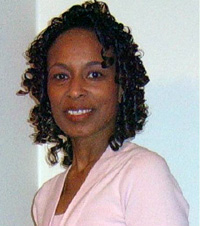
Shawn Collins, acting director, Taxpayer Advocacy Panel
You have a unique opportunity to contribute to improving your tax administration system by becoming a member of the IRS Taxpayer Advocacy Panel (TAP). We are seeking approximately 40 civic-minded volunteers from around the nation to serve on the TAP, which listens to taxpayers, identifies key issues and makes recommendations for improving IRS service and customer satisfaction.
“TAP members are your friends and neighbors, walking in the shoes of the average taxpayer. A better understanding of how to serve the taxpayer well is a key to sound tax administration,” said Doug Shulman, IRS Commissioner.
TAP provides a forum for taxpayers from all 50 states as well as the District of Columbia and Puerto Rico. New TAP members will serve a three-year term starting in December 2009. Our members come from a wide variety of backgrounds including tax practitioners, college students, small business owners and retirees.
Each member serves on two subcommittees. One is a geographic subcommittee that allows the member to represent his or her state. The other is a national issue subcommittee that works directly with IRS personnel in identifying and improving IRS programs, policies and procedures. In all, a member may dedicate 300 to 500 hours of volunteer work in a year. These hours are apportioned by participating in monthly meetings (teleconferences), two annual face-to-face meetings (one per committee) and a mandatory orientation meeting held in December. The term of a TAP member is 3 years and that of an alternate is two years.
“As the IRS continues to examine taxpayers’ needs in the area of service, the Taxpayer Advocacy Panel has emerged as a vital source for gathering and providing information from the perspective of taxpayers,” said Nina E. Olson, National Taxpayer Advocate. “TAP’s role will ultimately aid taxpayers by helping the IRS to provide them with the top quality service they deserve.”
“Best in Class Hispanic Strategies” audio recording


Presenters Carlos Santiago and Derene Allen
-
Find out what makes 25 percent of the top 500 Hispanic market advertisers out perform the remaining companies
-
Discover what questions to ask, steps to take to be a Best in Class company
Click here for more about “Best in Class Hispanic Strategies” audio recording
One of the 15 committees that comprise the TAP is the Multi-Lingual Committee. This committee works closely with the IRS to review Spanish translations of IRS publications, such as Publication 17, for accuracy, and to develop outreach strategies for English as Second Language communities. The Multi-Lingual Committee needs English-Spanish speaking bilingual members to accomplish its mission.
Julie Jason, the current TAP panel member for Connecticut, is a money manager and principal of Jackson, Grant Investment Advisers and a financial columnist for several Connecticut newspapers. She will be completing her three-year term in November.
Jason sums up the experience, “As I have said many times to anyone who will listen, I recommend that tax preparers, accountants, attorneys, and members of the general public consider volunteering for TAP. You will learn more about how the IRS works, meet some of the most impressive tax specialists you will ever come across (IRS subject-matter experts), get to know a very dedicated TAP staff, and work shoulder-to-shoulder with other TAP volunteers from across the nation. There is great satisfaction in being able to have a part in helping improve the taxpayer’s experience with the IRS.”
To be a member of TAP you must be
- a U.S. citizen, current with your tax obligations,
- able to commit 300 to 500 hours during the year, and
- pass an FBI criminal background check.
For the Taxpayer Advocacy Panel to be most effective, the members of the Panel must possess good interpersonal communications skills, organizational skills, and have access to a computer. Members should also have good listening skills and the ability to problem solve within a group of other civic-minded professionals. Ideal candidates should be able to separate their personal views from TAP/IRS issues.
This year TAP is accepting applications to fill member and alternate vacancies from individuals who reside in the locations listed below. Applicants selected from these locations will serve a three-year membership term beginning in December 2009, or be chosen as an alternate member to be considered for membership if a vacancy occurs in their state during the next two years.
Member and Alternate Vacancies – Arkansas, California, Connecticut , Florida, Georgia, Illinois, Kentucky, Maryland, Minnesota, Missouri, New Jersey, New Mexico, North Carolina, North Dakota, Ohio, Oregon, Pennsylvania, Tennessee and Texas.
Alternate Vacancies Only – Alaska, Arizona, Delaware, District of Columbia, Hawaii, Idaho, Indiana, Kansas, Massachusetts, Michigan, Montana, Nebraska, Nevada, New Hampshire, Puerto Rico, South Dakota, Vermont, Virginia, West Virginia and Wyoming.
All applications must be received no later than April 30, 2009. If you know someone interested in applying for a TAP opening, please refer that individual to the website improveirs.org or the TAP toll-free line at 1-888-912-1227 to request an application.
A team composed of IRS professionals will review applications and rank candidates by their experience and suitability. The most qualified candidates will be interviewed by a team comprised of IRS staff and a current TAP member. Interviews usually take place in June and July. The Secretary of the Treasury will review the recommended candidates and make final selections in October or November.
The Department of the Treasury, the IRS, and the Taxpayer Advocacy Panel are committed to creating the most user-friendly, customer-oriented tax administration system possible. We are looking forward to fulfilling the TAP vision: Citizen Volunteers valued for improving IRS services. With your help, we can make that happen.
Shawn is the acting director of the Taxpayer Advocacy Panel (TAP) program in Washington, DC. She has a staff of 24 employees who support 100 citizen volunteers from across the country. She became a revenue officer in Hampton, VA in 1991 and spent 13 years as a field revenue officer working collection cases in Virginia, South Carolina, Texas, Ohio, and Utah. Shawn joined the ranks of management in February 2004 as the Collections Field Manager in West Chester, OH.
Posted by Elena del Valle on April 17, 2009
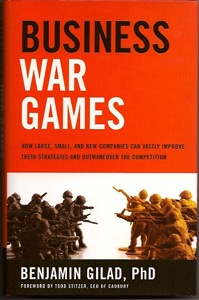
Business War Games book cover
For 25 years Benjamin Gilad, Ph.D. has helped large companies design and run competitive games to make determinations about product and service launches and strategy. This year, the former associate professor published a 223-page hardcover book, Business War Games How Large, Small and New Companies Can Vastly Improve Their Strategies and Outmaneuver the Competition (Career Press, $19.99), designed to make this concept accessible to everyday business people and small companies.
What are war games? An increasingly popular approach to making decisions at the highest echelons of corporate America. These games provide executives a simulation, often relying on sophisticated computer modeling, expert consultants and extensive exercises, to anticipate results, and how customers and the competition will respond to a proposed project launch. The basic concept is to explore ideas that can later, if successful in the games, be implemented in the business and survive in the market.
Gilad believes war games need not be costly or rely on expensive consulting services. In the first chapter of the book, he proposes that the every business person facing a decision involving competitors should have access to the games experience. According to him, they provide a way for decision makers to asses and estimate market changes; test applicable strategies; create and test plans to target the markets of competitors or anticipate threats from competitors; and protect new products and services when they are introduced into the market.
To explain the concept and how to take advantage of it, he divided the book into four sections: From Sand Table to Boardroom, Competitors as Characters, Step-by-Step, and Running a Business War Game. Although he concedes that the term “business war games” may be deceptive since they are not really about wars, he argues that in lieu of a better term or acronym (he mentions IRS for Iterations of Rival Strategies among less desirable options) he prefers war games because it sounds like fun and having fun is one of the most important characteristics of these exercises.
Gilad, who ran war games for Fortune 500 companies for 25 years, has a Ph.D. in economics. A former associate professor of strategy at Rutgers University, he is the founder and president of the Academy of Competitive Intelligence.

Business War Games
Click here to buy Business War Games
Comments:
Filed Under: Books
Posted by Elena del Valle on April 15, 2009
By Barbara L. Allan
CEO, SRA Research Group Inc.
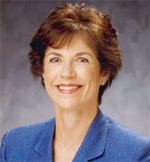
Barbara Allan
Photo: SRA Research Group, Inc.
SRA Research Group, Inc. (SRA) has found, in the 15 plus years we have been conducting primary research regarding Hospice that most people have heard of it. Despite this, many don’t really know what it means or what it provides. This is because Hospice falls into the category of “I don’t need it now so I don’t need to know more about it.” This category of people simply have no desire to learn more.
Once a family comes to grips with the realization that a loved one may require Hospice care, the door opens. However, we have found the door does not open as wide for Hispanics as it does for white non-Hispanics.
Click here to read the complete article
Listen to Cesar Melgoza discuss
“Changing Latino Landscape” audio recording

Presenter Cesar Melgoza, managing director, Latin Force Group
Find out about
• How demographic, social, political and economic factors affect Latinos
• Number of Hispanics in U.S.
• Hispanics as a percent of the mainstream population
• Number of Puerto Ricans in Puerto Rico
• Hispanics, including Puerto Rico, as a percent of U.S. mainstream
• Number of Asians and African Americans
• Estimated size of Hispanic market by 2012
• Percentage growth of new Hispanics per year
• Number of counties where Latinos are majority
• Areas of significant Latino growth
• Area of U.S. with a 950 percent Latino growth
• Role of acculturation
• Hispanicity segmentation
Click here for information on the Changing Latino Landscape
Posted by Elena del Valle on April 13, 2009
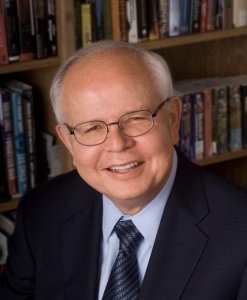
Harry Pachon, president and chief executive officer, Tomas Rivera Policy Institute
Photo: Tomas Rivera Policy Institute
Between 2005 and 2006 the number of Voice over Internet Protocol (VoIP) subscribers grew 189 percent from 1.9 million to 5.5 million, proof of the increasing popularity of the Internet based telecommunications option. Although making phone calls online can be a cheap alternative to traditional phone company services, and many Latinos are familiar with VoIP service providers and think the service can offer lower telephone costs, most of the respondents of a recent study have not embraced the technology because they are unfamiliar with how it works or how it can benefit them.
A report by the Tomás Rivera Policy Institute (TRPI) at the University of Southern California indicates for communication services, VoIP adopters spend an average of 13 percent less per month than Internet connectors who do not use VoIP. In addition, VoIP calling rates, especially for international service, are significantly lower than the fees charged by conventional phone service providers.
“Providers of VoIP services are successful in whetting Latinos’ appetites for new and cheaper telecommunication services; but to help individuals and families make the leap and adopt these services, it is going to take well orchestrated efforts to educate and familiarize them with the technology. In this quest, it is critical to form partnerships, especially at the local level, among public, private and non-profit organizations,” said Matthew D. Matsaganis, Ph.D. who authored the report.
As part of the study funded by Zero Divide, Social Impact of Voice over Internet Protocol on Latinos, researchers examined Latino awareness and perceptions of VoIP and Internet-based phone services; Latino attitudes about and use of landline phones, cell phones, computers and the Internet; and how much Latino VoIP users pay for communication services compared to those Latinos who do not rely on VoIP options.
The report is divided into four main parts that outline the VoIP market, provide information about the benefits of VoIP technology and the state of VoIP, as well as VoIP usage among Latinos and related issues.The report presents implications and policy recommendations to improve education, access, and research for Latinos using Internet-based telephony.
“VoIP could help Latino immigrants connect with their homeland families and friends at a relatively low cost,” said Harry Pachon, Ph.D., president of TRPI and professor of Public Policy at the University of Southern California. “However, lower rates of home computer use by Latinos negatively impact the adoption of these less costly VoIP services.”
Founded in 1985, the Tomás Rivera Policy Institute (TRPI) mission is to advance informed policy on “key issues affecting Latino communities through objective and timely research contributing to the betterment of the nation.” TRPI is an affiliated research unit of the University of Southern California School of Policy, Planning, and Development, and is associated with the Institute for Social and Economic Research and Policy at Columbia University.
“Moving Beyond Traditional Media Measurement: measuring conversations and social media” audio recording

Presenter Katie Delahaye Paine, founder, KDPaine & Partners
Find out about
- Issues affecting online public relationships today
- Testing relationships as part of a survey
- Measuring ethnic group relationships
- Measuring foreign language communications in a similar ways to English
- Biggest challenges measuring conversations and social media
- Measuring online relationships with little or no money
Click here for information on “Moving Beyond Traditional Media Measurement”
Posted by Elena del Valle on April 10, 2009
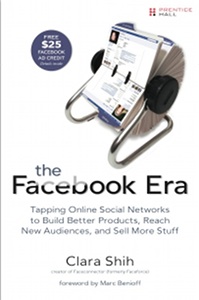
The Facebook Era book cover
Photos: Prentice Hall Professional
For people interested in reaching prospects online social networking, especially websites like Facebook with 150 million members, may offer a desirable target. That forum is so large 400,000 developers have created 24,000 applications for the system. The same characteristic that makes Facebook desirable, its many members, makes tapping it daunting. Social networking advocates believe that because university graduates are accustomed to social networking from their college days and may continue their use as they enter the workforce making social networking sites indispensable as a future business tool. At the same time, eager new users question the tangible long term business benefits of social networking and wonder how they should get started.
This year, a new expert joined the many fans of social networking with a “how to” guide. Clara Shih wrote The Facebook Era: Tapping Online Social Networks to Build Better Products, Reach New Audiences, and Sell More Stuff (Prentice Hall Professional, $24.99) to share suggestions about how business people can leverage social networking to change the way they do business and profit from it.
The 236-page paperback book includes a 60-day action plan to help readers benefit from using social networks. It is divided into 12 chapters in three main parts: A Brief History of Social Media, Transforming the Way We Do Business, and Your Step By Step Guide to Using Facebook for Business. In the first section she examines the current state of social networking; she then explores ways in which specific company areas can benefit from social forums; and in the last four chapters she provides suggestions to implement the ideas she presented in the previous section.

Author Clara Shih
Shih created Faceconnector (formerly Faceforce), one of the first business applications on Facebook. She is also product line director of AppExchange, salesforce.com’s online marketplace for business software-as-a-service applications built by third-party developers. Previously, the author worked in strategy and business operations at Google, and before that as a software developer at Microsoft.
She is the founder and serves on the board of directors of Camp Amelia Technology Literacy Group, an East Palo Alto, California-based 501(c)(3) nonprofit that develops and distributes technology education software and curriculum. Clara holds undergraduate and graduate degrees in economics and computer science from Stanford, and has a Master’s Degree in Internet studies from Oxford, where she was as a United States Marshall Scholar.
Her first book, Using New Media, was commissioned by UNESCO to help teachers, parents, and school administrators in developing countries use digital media to adopt best practices and distribute high-quality content and curriculum. Shih is an immigrant to the United States from Hong Kong and learned English as a second language.
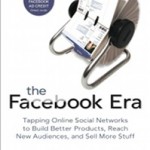
Facebook Era book cover
Click here to buy The Facebook Era
Comments:
Filed Under: Books
































